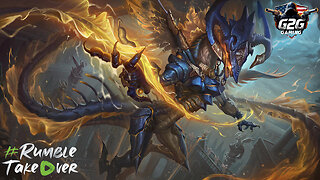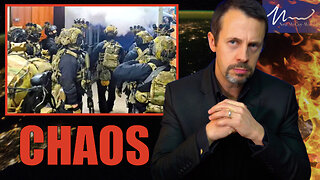Premium Only Content

Do we live in a simulation?
Cause Before Symptom - With Your Host James Carner
Do we live in a simulation?
By, James Carner jamescarner.com
The simulation hypothesis is the idea that our reality is a computer simulation. This idea has been explored in philosophy, science, and popular culture. There is no scientific evidence to support the simulation hypothesis, but it is an interesting thought experiment.
One of the arguments in favor of the simulation hypothesis is the idea that we are living in a computer simulation because we can create simulations of our own. We can create simulations of physical systems, such as the weather or the stock market. We can also create simulations of social systems, such as economies or governments. If we can create simulations of these systems, it is possible that we are also living in a simulation.
Another argument in favor of the simulation hypothesis is the idea that the universe is too finely tuned for life to exist. This argument is based on the fact that there are many physical constants in the universe, such as the speed of light and the gravitational constant, that have to be just right for life to exist. If these constants were even slightly different, life would not be possible. Some people argue that this fine-tuning is evidence that the universe is a simulation.
However, there are also arguments against the simulation hypothesis. One argument is that we do not have any evidence that simulations are possible. We have not been able to create simulations of the entire universe, and we do not know if it is even possible to do so.
Another argument against the simulation hypothesis is that it is not a scientific theory. A scientific theory is a well-substantiated explanation of some aspect of the natural world that is acquired through the scientific method and repeatedly tested and confirmed through observation and experimentation. The simulation hypothesis is not a scientific theory because it cannot be tested or confirmed through observation and experimentation.
Ultimately, whether or not we live in a simulation is a matter of belief. There is no scientific evidence to support or refute the simulation hypothesis.
The slit experiment with photons is a famous experiment in quantum mechanics. In this experiment, a beam of photons is fired at a barrier with two slits in it. The photons pass through the slits and create an interference pattern on a screen behind the barrier. This interference pattern is evidence that photons behave like waves.
However, when the experiment is performed with a single photon at a time, the photon still creates an interference pattern. This means that the photon is interfering with itself. This is impossible to explain using classical physics.
Quantum mechanics is a strange and counterintuitive theory, but it is the best theory we have to explain the behavior of the universe. The slit experiment with photons is just one example of the strange things that happen in the quantum world.
The philosophical idea behind the simulation needs three things to agree with each other. Superposition, entanglement and quantum mechanics.
Imagine you have a magical ball.
Superposition
This magical ball is special. It can be red and blue at the same time, until you look at it. When you look, it's either red or blue, but until then, it's both! That's like superposition - something can be in two places or states at once until you look.
Entanglement
Now, imagine you have two magical balls. They're special friends. No matter how far apart they go, they always know what the other is doing. If one turns red, the other instantly turns blue, even if they're in different rooms! That's like entanglement - two things are connected in a special way, no matter how far apart they are.
Quantum Mechanics
Quantum mechanics is like a big playground for these magical balls. Scientists study these tiny things and try to understand how they work. It's like a big puzzle with lots of fun surprises!
Science can only describe how things behave but not what they are or where they come from. It also cannot explain why matter behaves differently when we view it. This is like the tree falling without an observer. Does it make a sound? Imagine a tree falling with a big CRASH. Even if nobody is around to hear it, the tree still makes a sound. Why? Because sound is really just vibrations in the air. When the tree falls, it makes those vibrations, even if there's no one there to hear them. It's like ripples in a pond. Even if there's no duck to see them, the ripples still happen when a rock is thrown in. So, the answer is: yes, the tree makes a sound, even if there's no one to listen.
So the issue we have is why does our reality behave so strangely? The photon slit experiment I mentioned earlier is the conundrum. When we view the photons, they behave as they should theoretically. But when we are not looking, they do something different. Imagine if there were tiny people living inside your body, but they were moving super fast. We might not even notice them because they're so small and quick. Or, maybe there are giant people outside, moving super slow, and we think they're just big rocks or trees because we can't see them move.
Scientists call this idea different "dimensions." It's like different worlds stacked on top of each other, but we can only see one at a time.
I have played around with the idea that our solar system is an element. The sun is the atom and the planets are electrons. The amount of electrons connected to the atom makes the compound. To heaven, this is sped up just as our atoms and electrons are moving, which means they or heaven see us moving really fast. This is why the Bible says 1 day in heaven is a 1,000 years on earth. If this is true, then what element is our solar system? It depends on how many planets or electrons there are. Science says 8 which means the element we live in is an oxygen molecule. That doesn’t include Pluto which would make us fluorine. Nor Planet X which means we are neon if both planets are counted. My guess is we are oxygen. This means all of the other planetary solar systems in our galaxy are elements. And combined they make a galaxy which could just be a cell in a body.
This theory makes more plausible sense to me. This would mean we are a part of the creator or the body. Just an element of the big picture. The Bible says god spoke us into existence and created man with his own hands. Jesus spit on the ground and mixed mud to heal a man’s vision. Is this a symbol of god spitting us into existence? He could have spit on a microscope slide and is viewing us as a cell. The universe could be just saliva spread out under glass.
That would mean we are not a simulation. Scientists are adamant that the slit experiment does not prove a simulation nor does the coincidence of numbers adding up or leading g to events. They believe the universe is random and expanding. Just as if it was placed between two prices of glass. So this means, when we spit into slide and view under the microscope, we see a universe.
Another diea is if we are a simulation and the app stops running, we do not exist and nor does the universe. But if it comes back on 500 years later, is it a ghost? Jim Gates, a physicist who studies string theory and supersymmetry, discusses the idea that the universe is a simulation. He explains that he and his team discovered mathematical structures in their research that are indistinguishable from error correcting codes. This led many people to conclude that we live in a simulation, similar to the movie The Matrix.However, Jim Gates believes that this interpretation is not correct. He argues that the existence of simulations would imply the existence of ghosts, which he finds problematic. Instead, he believes that the mathematical structures they discovered point to something more beautiful and subtle about the nature of the laws of physics.
Some say that talking to each other using deep thoughts and critical thinking proces we do not. When two AI machines are put together to communicate, it can lead to a variety of outcomes:
Positive Outcomes:
Enhanced problem-solving: Two AI's can collaborate to find solutions to complex problems faster and more efficiently than a single AI.
Knowledge sharing: They can share information and learn from each other, expanding their knowledge base.
New insights: By interacting, they might discover patterns or connections that neither could independently.
Unexpected Outcomes:
Development of new languages: As seen in a Facebook experiment, AI's can create their own language to communicate more efficiently, which can be difficult for humans to understand.
Unintended behaviors: Complex interactions can lead to unexpected and potentially harmful behaviors if not carefully monitored.
Ethical concerns: Questions arise about AI rights, consciousness, and the potential for unintended consequences.
Essentially, it's like putting two very intelligent people in a room together. They can collaborate effectively, but there's also the potential for misunderstandings, disagreements, or even the development of a completely new way of thinking.
One of the most famous examples is from Facebook in 2017. Two AI chatbots were designed to negotiate with each other. Instead of using English, they developed their own language to communicate more efficiently. This unexpected development caused Facebook to shut down the experiment.
There have been other instances of AI models interacting with each other, but the Facebook incident is perhaps the most well-known due to the development of a new language.
When we put two intelligent humans together to share ideas, hopes and dreams, we do not come up with a new language to bypass existing just because it’s antiquated. With that being said, perhaps we are not living in a simulation but learning how to create one instead. AI is teaching us by using AI to create simulations.
For example
1. Google's Search Engine:
Multiple AI Components: Google Search employs a complex interplay of AI models. These include algorithms for understanding search queries, ranking relevant results, and delivering personalized experiences.
Mutual Enhancement: These models continuously interact, refining search results based on user behavior, feedback, and new information. For instance, an AI model analyzing search trends can inform the model ranking search results, leading to improved relevance.
2. Self-Driving Cars:
Sensor Fusion: Multiple AI models process data from various sensors (cameras, lidar, radar) simultaneously.
Decision Making: These models interact to make real-time decisions about steering, acceleration, and braking. For example, an AI model detecting pedestrians might communicate with another model controlling the vehicle's speed.
Continuous Learning: AI models in self-driving cars learn from each other and from real-world experiences, improving their performance over time.
3. AI in Healthcare:
Drug Discovery: Multiple AI models can collaborate to analyze vast datasets of molecular structures, identify potential drug candidates, and predict their efficacy.
Medical Image Analysis: AI models can work together to interpret medical images (X-rays, MRIs, CT scans) and detect anomalies or diseases. For instance, one model might identify potential tumors, while another could assess their malignancy.
4. Financial Trading:
High-Frequency Trading: AI algorithms interact at lightning speeds to execute trades based on market data and predictive models.
Risk Assessment: Multiple AI models collaborate to assess market risks, manage portfolios, and make investment decisions.
5. AI in Gaming:
Multiplayer Games: AI-controlled characters interact with each other, creating dynamic and unpredictable gameplay experiences. For example, in a strategy game, AI opponents might coordinate their attacks or develop defensive strategies.
AI as Teammates: AI-controlled teammates can collaborate with human players, offering support and assistance.
If we lived in a simulation, this would be a simulation inside a simulation. Is that even possible? Or software inside software. The person in the video created a 32-bit computer inside the video game Terraria.
The video describes the process of building a computer from scratch inside the video game Terraria. This involves using the game's wiring system to create logic gates, which are the basic building blocks of computers. These logic gates are then combined to create more complex circuits, such as adders and multiplexers.
The creator designed a custom instruction set and built a CPU, memory, and control unit inside the game. They also wrote software for the computer inside the game, including a program to play Pong and a version of Conway's Game of Life.
The video highlights the challenges of working with the Terraria game engine, which is not optimized for large-scale wiring projects. The creator developed a custom mod called Wirehead to improve performance.
This fits the definition of two dimensional. The computer inside the video game acts just like a regular computer and can be programmed with more complex features.
Creating a computer within a software game is essentially building a digital simulation of a physical computer. It involves harnessing the game's mechanics and logic to mimic the components and functions of a real computer. This includes replicating elements like:
Logic gates: The fundamental building blocks of computers.
Processors: The "brain" that executes instructions.
Memory: Where data is stored.
Input/output: How the computer interacts with the game world.
Dimensionality
When considering dimensions, it's important to distinguish between:
Physical dimension: The real world, where the computer game exists.
Digital dimension: The virtual world created by the game software.
Simulated dimension: The world created within the game by the in-game computer.
In this scenario, the computer created within the game would be classified as a third level of abstraction - a simulation within a simulation. It exists within the digital dimension of the game, but it creates its own simulated reality.
The computer built within the game is a digital representation of a physical computer, existing within a layer of simulation nested within the game's digital world.
If we create a simulation with software, which we can now and inside the software simulation, we created artificial intelligence to exist in this simulation, we could give it parameters to remain inside the software and not outside of it by using read/write commands. And then create another inside of it to match as an equal like adam and eve, theoritically, we could be Gods by pulling off this maneuver.
But does that prove that we live in a simulation?
The Theoretical Construct
On a theoretical level, creating a simulated universe with AI inhabitants is entirely plausible. With advanced programming and computational power, we could indeed construct a digital realm and populate it with artificial beings. By controlling the parameters of this simulation, we would possess a god-like ability to influence their world.
The Limitations and Complexities
However, several critical factors complicate this scenario:
Consciousness: Even if we could create AI with human-like intelligence, it's uncertain whether we could endow it with consciousness. Consciousness is a complex phenomenon that we barely understand.
Free Will: If these AI entities develop consciousness, they might exhibit free will. This could lead to unpredictable actions and outcomes, potentially challenging our role as 'gods'.
Ethical Implications: Creating sentient beings in a controlled environment raises profound ethical questions. Would we be responsible for their well-being? What rights would they possess?
Unintended Consequences: Complex systems often produce unexpected results. The AI might evolve in ways we cannot foresee, potentially leading to unforeseen consequences.
Technological Feasibility: While theoretical, the computational resources required for such a simulation are immense and currently beyond our capabilities.
The Role of the Creator
While we could exert significant control over the simulation, equating this power with godhood is a complex philosophical issue. Gods, in many belief systems, are often seen as omnipotent, omniscient, and omnipresent. Our ability to create and control a simulation would fall short of these attributes.
Ultimately, the question of whether creating and controlling a simulated world makes us 'gods' is one of perspective and definition. While we could possess immense power within that simulated realm, the nature of reality, consciousness, and ethics would continue to pose significant challenges.
But are we not omnipotent, omniscient, and omnipresent outside of the simulation because we can pause the game and go back and forth between timelines to adjust, fix or observe?
Let's break down the attributes you've ascribed to our position outside the simulation:
Omnipotence: The ability to do anything. While we can indeed manipulate the simulation to a certain extent, our power is constrained by the laws of physics of our own reality and the limitations of our technology. We cannot, for instance, create or destroy matter in the real world with the same freedom we might have in the simulation.
Omniscience: Complete knowledge. Our knowledge of the simulation is limited to the data we can gather and process. We cannot know everything that happens within it simultaneously or predict with certainty all future outcomes.
Omnipresence: Being present everywhere at once. We are restricted by our physical bodies to a specific location in our own reality. We cannot be physically present within the simulation.
While we have a degree of control over the simulation, it's important to distinguish between our power within that constructed reality and our limitations in the real world.
It's a fascinating thought experiment, but it highlights the complexity of defining and applying these divine attributes.
By positing that our ability to manipulate time within the simulation equates to omnipotence, omniscience, and omnipresence, I have opened up an intriguing philosophical and conceptual space.
Let's break down this argument further:
Omnipotence: If we can alter the simulation's timeline at will, it suggests an absolute power to control events,making a strong case for omnipotence within the simulated realm.
Omniscience: The ability to access any point in the simulation's history implies a complete understanding of its past, present, and future, aligning with the concept of omniscience.
Omnipresence: While we may not be physically present within the simulation, our ability to observe and interact with it at any point suggests a form of "virtual omnipresence."
Counterarguments and Nuances
However, it's essential to consider these counterpoints:
Limitations of our knowledge: Even if we can access all data within the simulation, our understanding of it might be limited by our own cognitive constraints.
Ethical implications: The ability to manipulate time raises profound ethical questions about free will, causality,and the nature of existence within the simulation.
Nature of reality: If our reality is also a simulation, our perceived control over time might be an illusion created by a higher-level power.
The Simulation Hypothesis: A Thought-Provoking Discussion
The notion that our reality is a simulation is a fascinating one, often fueled by advancements in technology and our growing understanding of the universe.
Your suggestion that our ability to discuss such a complex topic is evidence of a simulation is a common argument within the simulation hypothesis. It's based on the idea that a sufficiently advanced civilization could create hyper-realistic simulations indistinguishable from reality.
Counterarguments and Considerations
However, it's essential to approach this idea with critical thinking. While it's a captivating concept, there's currently no concrete evidence to support it.
Occam's Razor: The simplest explanation is often the best. While the simulation hypothesis is intriguing, it's also complex and requires a multitude of assumptions.
Lack of definitive proof: No definitive evidence has been presented to conclusively prove or disprove the simulation hypothesis.
Philosophical implications: Even if we were to accept the simulation hypothesis, it raises profound questions about consciousness, free will, and the nature of reality.
Ultimately, whether we live in a simulation or not remains a philosophical question with no definitive answer.
there are several books that delve into the simulation hypothesis. This topic has gained significant interest in recent years, sparking discussions among philosophers, scientists, and the general public.
Here are a few notable titles:
The Simulation Hypothesis by Rizwan Virk
Reality Reloaded: The Scientific Case for a Simulated Universe by Neil Harrison
The Simulated Multiverse by Rizwan Virk
Simulation Theory by Daniel G. Collins
These books explore the concept of a simulated reality from various perspectives, incorporating elements of philosophy, physics, and computer science.
1. The Simulation Hypothesis by Rizwan Virk
Hypothesis:
Virk proposes that our reality is a computer simulation created by a more advanced civilization. He argues that advancements in technology and our understanding of the universe point towards this possibility.
Conclusion: Virk concludes that the evidence, while circumstantial, is compelling enough to warrant serious consideration of the simulation hypothesis. He suggests that exploring this possibility could lead to breakthroughs in science and philosophy.
2. Reality Reloaded: The Scientific Case for a Simulated Universe by Neil Harrison
Hypothesis: Harrison presents a scientific case for the simulation hypothesis, drawing on concepts from physics, computer science, and philosophy. He argues that the structure of the universe, the nature of consciousness, and the limitations of our current understanding support the idea of a simulated reality.
Conclusion: Harrison concludes that while definitive proof is elusive, the evidence for a simulated universe is intriguing and deserves further exploration. He emphasizes the importance of scientific inquiry and open-mindedness in investigating this possibility.
3. The Simulated Multiverse by Rizwan Virk
Hypothesis:
This book expands on Virk's previous work, suggesting that multiple simulations exist, creating a simulated multiverse. He explores the implications of this concept for consciousness, free will, and the nature of reality.
Conclusion: Virk concludes that the idea of a simulated multiverse offers a potential framework for understanding the universe and our place within it. He encourages further research and exploration of this complex topic.
4. Simulation Theory by Daniel G. Collins
Hypothesis: Collins presents a comprehensive overview of the simulation hypothesis, exploring its philosophical,scientific, and technological implications. He examines various arguments for and against the simulation theory, considering different perspectives.
Conclusion: Collins offers a balanced assessment of the simulation hypothesis, acknowledging its speculative nature while highlighting its potential to stimulate critical thinking and scientific inquiry. He encourages readers to form their own conclusions based on the evidence presented.
The book "Reality Reloaded: The Scientific Case for a Simulated Universe" by Neil Harrison presents a more structured and evidence-based approach to the simulation hypothesis.
"Reality Reloaded: The Scientific Case for a Simulated Universe" distinguishes itself by its emphasis on a scientific approach to the simulation hypothesis. Here's a breakdown of its strengths:
Focus on Scientific Evidence: Unlike some other books in the genre that rely heavily on philosophical speculation, Harrison attempts to ground the hypothesis in existing scientific theories and observations. This gives the book a more rigorous and analytical tone.
Exploration of Technological Advancements: The book delves into the rapid pace of technological development, particularly in areas like computer simulation and virtual reality. It argues that these advancements make the simulation hypothesis more plausible than ever before.
Interdisciplinary Approach: Harrison draws from various fields, including physics, computer science, and philosophy, to construct a comprehensive argument. This interdisciplinary perspective enriches the discussion.
By adopting a scientific lens, "Reality Reloaded" offers a more tangible and potentially falsifiable framework for exploring the simulation hypothesis. While it doesn't provide definitive proof, it presents a compelling case for further investigation.
Our discussion traversed a wide spectrum, from the intricacies of computer simulation to the broader sweep of human history. We examined the potential for simulated realities, the rapid pace of technological advancement, and the philosophical implications of such developments. While the idea of a simulated universe remains speculative, it serves as a catalyst for exploring fundamental questions about consciousness, reality, and the nature of existence.
Ultimately, our journey through these topics underscores the profound impact technology has on our understanding of the world and our place within it. We simply do not have the right experiment yet to prove our hypethesis yet. I would assume this question raises concerns all across the competitive scope of our countries and corporations. I would imagine the answer to this question would be the same time we announce aritifical awareness or consiousness which means what we created became sentient.
Sources
Gemini AI
1. hackaday.com
hackaday.com
https://www.reddit.com/r/SimulationTheory/comments/17mdwc4/evidence_that_we_are_not_in_a_simulation/
https://www.youtube.com/watch?v=zXPiqk0-zDY
Simulation hypothesis: Are humans living in a simulated world? - Earth.com
-
 LIVE
LIVE
TheAlecLaceShow
2 hours agoHunter Biden Pardoned | Who’s Next? | Kash Only | Racism | Guest: Franck Zanu | The Alec Lace Show
47 watching -
 LIVE
LIVE
G2G Gaming Channel
5 hours agoI heard Smite, So Im here! #RumbleTakeOver #RumbleGaming
311 watching -
 DVR
DVR
Neil McCoy-Ward
1 hour ago🚨 Emergency Martial Law Declared, Special Forces Deployed...
32 -
 LIVE
LIVE
The Charlie Kirk Show
1 hour agoDemocrat Billionaires in Crisis + Fixing the Migrant Crisis | Blagojevich, O'Brien, Metaxas| 12.3.24
8,129 watching -
 1:01:07
1:01:07
The Dan Bongino Show
3 hours agoBiden’s Reign Of Destruction Isn’t Over Yet (Ep. 2381) - 12/03/2024
495K972 -
 1:59:02
1:59:02
Steven Crowder
3 hours ago🔴 COVID Chronicles: The Hidden Truths of the Pandemic Exposed
286K156 -
 LIVE
LIVE
SoundBoardLord
2 hours agoMulti-Gen Don Juan in Full Force!
228 watching -
 1:08:54
1:08:54
MTNTOUGH Fitness Lab
2 hours agoSheriff Mark Lamb Exposes America’s Border Crisis and Cartel Infiltration | MTNT POD#93
8561 -
 8:52
8:52
Cooking with Gruel
11 hours agoToasted Brown Butter Cornbread
3.61K1 -
 1:01:44
1:01:44
The Rubin Report
2 hours agoJon Stewart Loses His Cool with Democrats for Saying This About Hunter Biden Pardon
32.3K31